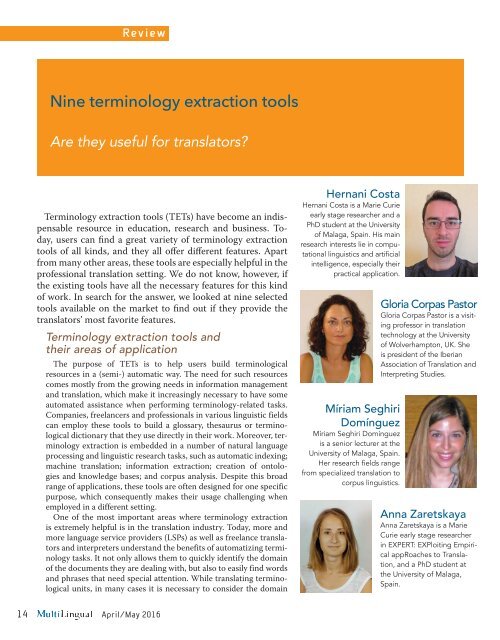Localization
z99kl79
z99kl79
You also want an ePaper? Increase the reach of your titles
YUMPU automatically turns print PDFs into web optimized ePapers that Google loves.
Review<br />
Nine terminology extraction tools<br />
Are they useful for translators?<br />
Terminology extraction tools (TETs) have become an indispensable<br />
resource in education, research and business. Today,<br />
users can find a great variety of terminology extraction<br />
tools of all kinds, and they all offer different features. Apart<br />
from many other areas, these tools are especially helpful in the<br />
professional translation setting. We do not know, however, if<br />
the existing tools have all the necessary features for this kind<br />
of work. In search for the answer, we looked at nine selected<br />
tools available on the market to find out if they provide the<br />
translators’ most favorite features.<br />
Terminology extraction tools and<br />
their areas of application<br />
The purpose of TETs is to help users build terminological<br />
resources in a (semi-) automatic way. The need for such resources<br />
comes mostly from the growing needs in information management<br />
and translation, which make it increasingly necessary to have some<br />
automated assistance when performing terminology-related tasks.<br />
Companies, freelancers and professionals in various linguistic fields<br />
can employ these tools to build a glossary, thesaurus or terminological<br />
dictionary that they use directly in their work. Moreover, terminology<br />
extraction is embedded in a number of natural language<br />
processing and linguistic research tasks, such as automatic indexing;<br />
machine translation; information extraction; creation of ontologies<br />
and knowledge bases; and corpus analysis. Despite this broad<br />
range of applications, these tools are often designed for one specific<br />
purpose, which consequently makes their usage challenging when<br />
employed in a different setting.<br />
One of the most important areas where terminology extraction<br />
is extremely helpful is in the translation industry. Today, more and<br />
more language service providers (LSPs) as well as freelance translators<br />
and interpreters understand the benefits of automatizing terminology<br />
tasks. It not only allows them to quickly identify the domain<br />
of the documents they are dealing with, but also to easily find words<br />
and phrases that need special attention. While translating terminological<br />
units, in many cases it is necessary to consider the domain<br />
Hernani Costa<br />
Hernani Costa is a Marie Curie<br />
early stage researcher and a<br />
PhD student at the University<br />
of Malaga, Spain. His main<br />
research interests lie in computational<br />
linguistics and artificial<br />
intelligence, especially their<br />
practical application.<br />
Míriam Seghiri<br />
Domínguez<br />
Míriam Seghiri Domínguez<br />
is a senior lecturer at the<br />
University of Malaga, Spain.<br />
Her research fields range<br />
from specialized translation to<br />
corpus linguistics.<br />
Gloria Corpas Pastor<br />
Gloria Corpas Pastor is a visiting<br />
professor in translation<br />
technology at the University<br />
of Wolverhampton, UK. She<br />
is president of the Iberian<br />
Association of Translation and<br />
Interpreting Studies.<br />
Anna Zaretskaya<br />
Anna Zaretskaya is a Marie<br />
Curie early stage researcher<br />
in EXPERT: EXPloiting Empirical<br />
appRoaches to Translation,<br />
and a PhD student at<br />
the University of Malaga,<br />
Spain.<br />
14 April/May 2016


